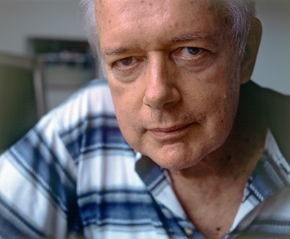 Léo RamosThe countless setbacks suffered by Marxism in the final decades of the 20th century never discouraged Leandro Konder, professor of philosophy, essayist, and writer. “Philosophy is a realm of resistance that doesn’t ask what a given theory is good for, but what the truth of that theory is,” he said in an interview to Pesquisa FAPESP in December 2002 (see Issue No. 82). Konder, one of Brazil’s most esteemed scholars of the works of Karl Marx, graduated in law, received his PhD in philosophy from the Federal University of Rio de Janeiro (UFRJ), and was a full professor at the Pontifical Catholic University in Rio de Janeiro (PUC/RJ). He passed away on November 12, 2014, at the age of 78 in Rio de Janeiro, a victim of Parkinson’s disease.
Léo RamosThe countless setbacks suffered by Marxism in the final decades of the 20th century never discouraged Leandro Konder, professor of philosophy, essayist, and writer. “Philosophy is a realm of resistance that doesn’t ask what a given theory is good for, but what the truth of that theory is,” he said in an interview to Pesquisa FAPESP in December 2002 (see Issue No. 82). Konder, one of Brazil’s most esteemed scholars of the works of Karl Marx, graduated in law, received his PhD in philosophy from the Federal University of Rio de Janeiro (UFRJ), and was a full professor at the Pontifical Catholic University in Rio de Janeiro (PUC/RJ). He passed away on November 12, 2014, at the age of 78 in Rio de Janeiro, a victim of Parkinson’s disease.
Konder was born in Petrópolis, Rio de Janeiro State; his father was a public health doctor and former leader in the Brazilian Communist Party (PCB). While Konder earned renown as a Marxist thinker and disseminator of the ideas of Hungarian philosopher Georg Lukács (1885-1971), he also worked as a labor attorney during the 1950s and 1960s. Shortly after Brazil’s 1964 military coup, he was quick to defend unions and workers. His ties to social movements took him to prison, where he was tortured. In 1972 he sought exile in Europe and lived in Germany, where he was a visiting professor at the University of Bonn, and in France. He returned to Brazil six years later.
Beginning in the 1980s, Konder served as professor at Bennett Methodist Institute, Universidade Federal Fluminense (UFF), and PUC/RJ. He devoted himself to disseminating scholarship on Marx and Lukács and to writing. He authored 21 books in all, venturing beyond philosophy into education, history, sociology, and memoirs. His first book, Marxismo e alienação (Marxism and alienation) (published by Expressão Popular), was published in 1965 and his last, Em torno de Marx (About Marx; Boitempo Editorial), in 2010. He also wrote two novels: A morte de Rimbaud (The death of Rimbaud; Companhia das Letras) and Bartolomeu (Bartholomew; Relume Dumará).
According to his friends, Konder enjoyed journeying among different genres. “He loved literature; he lived for literature and philosophy,” fellow philosopher and essayist Sergio Paulo Rouanet told the newspaper O Globo. “He was among the less dogmatic Marxists, known for his gentle ways, charisma, and generosity.” In the opinion of Marco Aurélio Nogueira, professor of political theory and director of the Institute of Public Policy and International Relations at São Paulo State University (Unesp), Konder was also recognized for his intellectual refinement and captivating prose. “Konder never made concessions to the doctrinairism and dogmatism so common in the Marxist universe and the communist field, where he was an activist his whole life,” Nogueira wrote in O Estado de S.Paulo. “As a professor, he never tired of stepping down from his pedestal and building bridges between accumulated knowledge and young intellectualism, men of culture, and democratic and socialist activists.” Journalist and author Zuenir Ventura told O Globo that Konder never ranked people according to their ideology. “He put human relationships above all else,” he said.
The image conveyed by his friends is the same that Konder showed during the interview with Pesquisa FAPESP mentioned earlier, when he talked about his aversion to polemics: “Machado de Assis used to say, ‘Controversy bores me to death’. I like dialogue and differences, but I have no patience when they’re expressed too aggressively.”
Republish